Achievements and Announcements
ACHIEVEMENTS
- Big grant wins for UniSA research projects
- Final year design student earns international acclaim
- Strong UniSA representation at SA Architecture Awards
- Global aerospace company set to expand industry partnership in 2026
- UniSA students awarded scholarships to support their First Nations education journey
- Researchers named Young Tall Poppies
- UniSA budding journalist recognised alongside state’s top media performers
- Dr Amelia Mardon recognised for outstanding research thesis
- UniSA physio student’s successful stretch at World Ultimate Frisbee Championships
- Other recent award winners
ANNOUNCEMENTS
ACHIEVEMENTS
Big grant wins for UniSA research projects
From debittering Australian table olives to developing an advanced form of ‘green concrete’, several UniSA research projects have been awarded significant funds.
Four UniSA research projects have won more than $2.4 million in funding from the Australian Research Council (ARC). The projects to be funded under the Linkage Projects 2024 Round 2 include:
Professor Martin Shanahan ($903,456)
Professor Martin Shanahan, Dr John Wilson and University of Adelaide colleague Dr Florian Ploeckl have teamed up with colleagues from two other universities and four community groups on a project to digitise over three million public records. They will use the records to compare life-course outcomes for two generations of 19th century Tasmanians and South Australians, examining intergenerational mobility and inequality. Still critical today, this research will fill a significant gap in the understanding of the long run determinants and persistence of inequality and social immobility in Australia.
Dr Zehong (Jimmy) Cao ($643,052)
The project aims to develop AI-enabled collaborative autonomy for complex spacecraft systems, by targeting efficient, safe and scalable decision-making capabilities to support satellite constellations in low earth orbit. It will address significant limitations in spacecraft executions, which currently rely on manual processes, leading to slow responses and tasking errors and delays. Specific outcomes will include advanced multi-agent reinforcement learning, as an AI toolkit enabling spacecraft autonomy in large (100+) satellite constellations and improved success in missions. The project will benefit the Australian space industry by positioning it as a leader in autonomous systems to service present and future real-world applications.
Professor Jun Ma ($300,420)
The project will develop strong, sustainable rubber materials by replacing fossil-based fillers with plant-derived cellulose nanofibres. Using a water-based treatment to help these fibres blend with rubber, the research aims to create eco-friendly composites that perform well in demanding industries like mining and manufacturing.
Associate Professor Thong Pham (584,833)
The project aims to develop an advanced form of ‘green concrete’ by combining calcined halloysite clay with recycled plastic fibres, all optimised using artificial intelligence. This innovative material will help reduce carbon emissions and plastic waste while improving the durability and cost-effectiveness of concrete used in construction. It’s a practical step toward achieving Australia’s net-zero targets by 2050 and tackling the global plastic waste crisis.
Fellowships and grants
In other achievements, a UniSA researcher has secured a $1.1 million Future Fellowship from the ARC. Dr Jun-Jie Zeng has been awarded the fellowship for a project aiming to address issues in the construction industry by producing a low-carbon concrete.
The conventional construction industry faces issues including high labour costs, high carbon emissions and material waste.
A novel co-extrusion technology will be developed, allowing printing of continuous fibre-reinforced thermoplastic polymer (CFRTP) reinforced cement-free concrete elements.
The project will lead to a revolution in infrastructure and building construction industries, contributing to a carbon-neutral society.
In another grant win, Industry Professor of Mechanical Engineering, Professor John Fielke, was awarded $2.1 million for a pre-commercial demonstration of a novel debittering process for a new style of table olive.
The project was awarded through the Department of Education’s Australia’s Economic Accelerator (AEA) Innovate program.
In addition, Adelaide-based organisation Spark has received almost $500,000 from the National Health and Medical Research Council (NHMRC) to expand its innovative work tackling loneliness on a local scale and fostering stronger, more connected communities.
Launched in the Adelaide Hills in 2024, Spark was co-designed by UniSA researchers, led by Dr Nadia Corsini, in partnership with The Hut Community Centre and the Adelaide Hills community. The pilot project quickly gained momentum and the team now plans to strengthen and expand Spark to reach more communities across South Australia.
Final year design student earns international acclaim
A final year graphic and communication design student has been lauded at an international graphic design competition, exposing him to an influential audience in the creative industries.
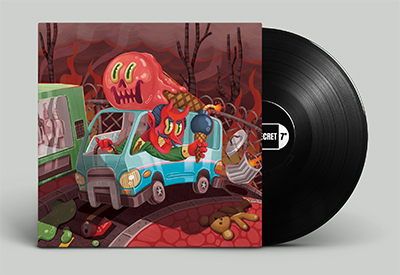 Jin Xin Kwok’s winning entry, Vice Cream Truck.
Jin Xin Kwok’s winning entry, Vice Cream Truck.Jin Xin Kwok, currently in the third year of a Bachelor of Graphic and Communication Design, was named as one of the winners of the D&AD New Blood Awards 2025 for his entry Vice Cream Truck.
He is the only winner from Australia in his category, and one of only three winners from Australia overall. Kwok was presented with a D&AD award at the award ceremony in London in July.
Each year, the D&AD Awards gather the world's best creative work from across the commercial design, advertising, production and craft disciplines to be judged by more than 300 global creative leaders, practitioners and innovators.
Kwok’s entry, Vice Cream Truck, is a record cover designed for Secret 7” – a record bringing together seven iconic tracks from seven of the world’s top musicians, each pressed just 100 times onto a seven-inch vinyl.
Kwok is an international student from Malaysia and says attending the D&AD Awards in London was a surreal, humbling and fulfilling experience.
“It means the world to me to be recognised alongside so many other talented, young, energetic people from around the world. It is eye-opening and a wonderful learning experience,” he says.
“Winning the only Yellow Pencil outside of Europe and US is the proudest moment of my education journey so far. It motivates me to work and push harder, and to become a better designer in general.”
Kwok hopes to remain in SA after graduation.
“After graduating, I would like to stay in South Australia to gain a couple of years of working experience in the local creative industry,” he says.
“I am excited to see where it leads me next.”
Strong UniSA representation at SA Architecture Awards
The outstanding contributions of UniSA architecture staff and alumni were recognised at the 2025 South Australian Architecture Awards recently.
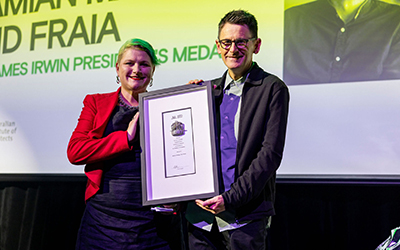 UniSA Associate Professor in Architecture Damian Madigan was awarded the President’s Medal. Photo by Frankie the Creative.
UniSA Associate Professor in Architecture Damian Madigan was awarded the President’s Medal. Photo by Frankie the Creative.The annual awards program was held by the Australian Institute of Architects’ SA chapter and showcased architectural excellence and innovation across the state.
UniSA’s Associate Professor in Architecture Damian Madigan was awarded the Sir James Irwin President’s Medal, while alumnus Gabrielle Seymour won the Emerging Architect Prize.
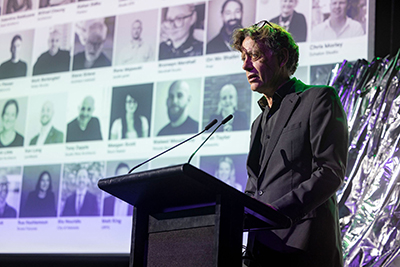 UniSA Creative’s Dean of Programs Associate Professor Stephen Ward was the 2025 Awards Director. Photo by Frankie the Creative.
UniSA Creative’s Dean of Programs Associate Professor Stephen Ward was the 2025 Awards Director. Photo by Frankie the Creative.2025 Awards Director and UniSA Creative’s Dean of Programs, Associate Professor Stephen Ward, says many of the University’s graduates also featured in awarded projects.
“UniSA architecture students have a contemporary, technologically rich and relevant education, including collaborating with local communities and the profession on real-world projects, and go on to make bold contributions across the architecture industry – from designing award-winning buildings and adaptive re-use projects, to revitalising precincts, and more,” he says.
“We’re proud to see so our staff and alumni represented in this year’s awards.”
Global aerospace company set to expand industry partnership in 2026
Global aerospace and defence company Northrop Grumman is looking to broaden its industry partnership with the new Adelaide University in 2026 following a highly successful internship program with UniSA over the past 18 months.
Two final year UniSA Bachelor of Engineering students have interned with Northrop Grumman Australia since early 2024, supporting the company’s efforts to streamline aircraft fleet sustainment.
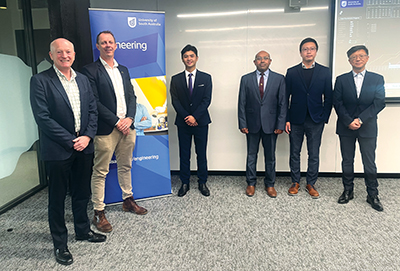 Huy Nguyen (third from left) is flanked by Northrop Grumman representatives and UniSA academic supervisor Professor Ke Xing.
Huy Nguyen (third from left) is flanked by Northrop Grumman representatives and UniSA academic supervisor Professor Ke Xing.The intern for 2025, Minh Huy Nguyen, recently provided a mid-year progress update on his final year engineering project to UniSA colleagues and Northrop Grumman representatives.
“I am working on a project aimed at addressing the growing complexity of aircraft maintenance planning,” Huy says.
“Traditional maintenance schedules are rigid and inefficient and do not account for real-time aircraft conditions, often leading to unnecessary downtime and high operational costs.”
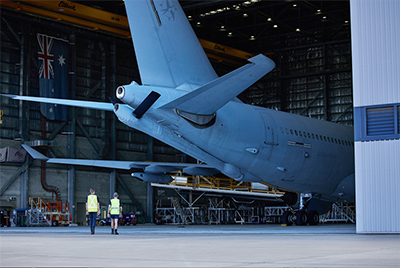 The Airbus A330, an aerial refuelling and military transport aircraft, is among the NGA fleet that will benefit from an effective maintenance schedule.
The Airbus A330, an aerial refuelling and military transport aircraft, is among the NGA fleet that will benefit from an effective maintenance schedule. Huy is helping to develop a sustainment planning system that integrates existing maintenance data and real-time inputs into a dynamic database. The new system will enable the company to generate maintenance plans up to four years ahead.
Northrop Grumman Australia (NGA) Senior Principal Engineer Dr Eric Yang says the company is looking to broaden its engagement with engineering interns in 2026, hoping to recruit talented students from the new Adelaide University.
“We plan to advance the research carried out by the UniSA interns by integrating maintenance policies across multiple platforms and supporting customised sustainment strategies at the fleet level,” Dr Yang says.
NGA Manager for Technology Outreach Dr Dushy Tissa, who was instrumental in setting up the internships, says the initial design provides a strong foundation for further development.
“Huy’s work will assist us in identifying bottlenecks and providing recommendations on how to better streamline sustainment operations,” Dr Tissa says.
UniSA students awarded scholarships to support their First Nations education journey
Two outstanding UniSA Education Futures students who have each been awarded an Aboriginal Tertiary Education Scholarship through Port Adelaide Enfield Council.
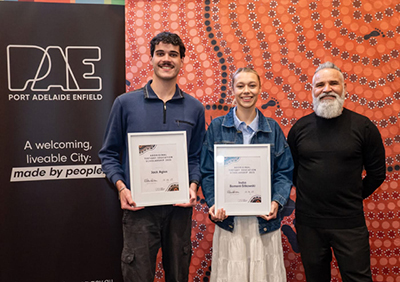 UniSA students Jack Agius and India Bament-Sitkowski, with City of Port Adelaide Enfield Aboriginal Community Development Lead Rodney Welch.
UniSA students Jack Agius and India Bament-Sitkowski, with City of Port Adelaide Enfield Aboriginal Community Development Lead Rodney Welch. Proud Narungga students, India Bament-Sitkowski, studying Primary Education (Honours), and Jack Agius, studying Secondary Education, will each receive $5000 to support their university studies.
The council’s Aboriginal Tertiary Education Scholarships support Aboriginal and Torres Strait Islander residents to achieve their educational aspirations and contribute to a thriving, inclusive community in the Port Adelaide Enfield area.
India hopes to become a primary school teacher, working with First Nations students in local schools. She already supports young people one day a week as a First Nations Student Support Officer and is passionate about giving back to the community and continuing her passion for helping others where she can have an impact through inclusive, culturally aware education.
Jack aspires to complete his studies and work as a full-time teacher in the Port Adelaide Enfield area. He is committed to helping young people succeed, particularly by supporting children’s understanding of the importance of English and outdoor education, while proudly sharing and celebrating his Aboriginal heritage through his teaching practice.
Researchers named Young Tall Poppies
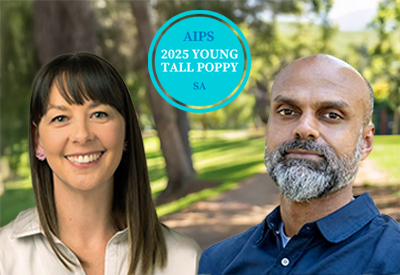 UniSA's Dr Sarah Boyle and Dr Ben Singh, recipients of SA's 2025 Young Tall Poppy Awards.
UniSA's Dr Sarah Boyle and Dr Ben Singh, recipients of SA's 2025 Young Tall Poppy Awards.Two UniSA researchers have been named among this year’s South Australian Young Tall Poppies, with their expertise in marine ecology and physical inactivity garnering this prestigious recognition.
The Young Tall Poppy science awards are an initiative of the Australian Institute of Policy and Science (AIPS) and have been established to celebrate researchers who combine cutting-edge science with a passion for engaging and inspiring others.
UniSA researchers honoured in the South Australian 2025 Young Tall Poppy Science Awards comprise:
Dr Sarah Boyle is an ARC DECRA Research Fellow at UniSA’s Centre for Cancer Biology, leading the Cancer Matrix and Mechanics Group within the Tumour Microenvironment Laboratory. Her research investigates how cancer cells hijack non-cancerous cells in their vicinity, and how physical stress in the tumour’s ecosystem promotes metastasis and recurrence. By identifying the mechanisms involved, she is paving the way for new treatments and improved patient outcomes.
Dr Ben Singh, from UniSA’s Allied Health and Human Performance Academic Unit, researches physical inactivity and why so many people remain physically inactive despite knowing the benefit of exercise. His research is focused on developing practical, evidence-based tools to help people move more in their daily lives. From tailored exercise programs to mobile apps and wearable devices, he explores how to keep people active and support them to live healthier lives.
UniSA budding journalist recognised alongside state’s top media performers
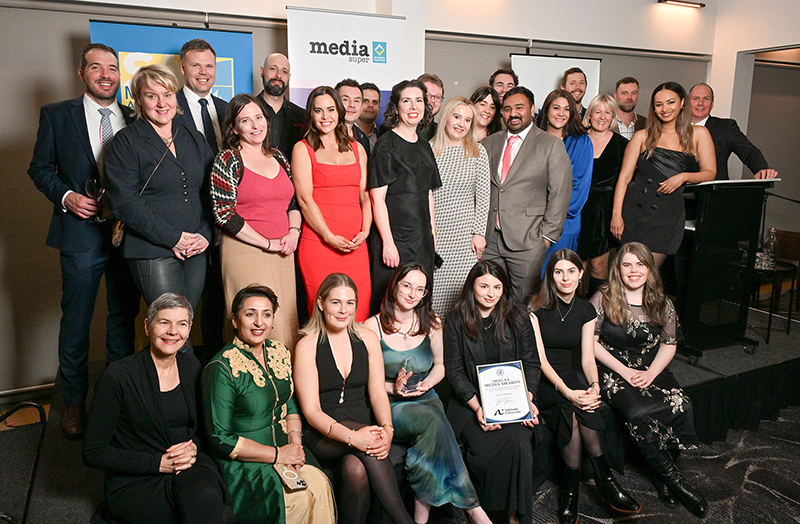 SA’s top media professionals and budding journalists attended the SA Media Awards recently.
SA’s top media professionals and budding journalists attended the SA Media Awards recently.A UniSA journalism student has been recognised at this year’s SA Media Awards for their exceptional results in their final year of study.
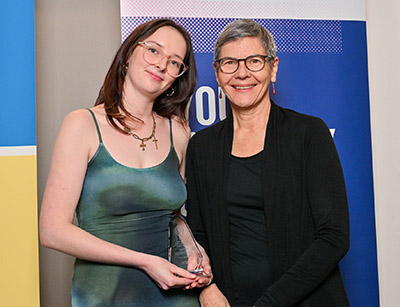 UniSA Program Director: Journalism Dr Bonita Mason (right) with student journalism award winner Rachel Forbes.
UniSA Program Director: Journalism Dr Bonita Mason (right) with student journalism award winner Rachel Forbes.Journalism and Professional Writing student Rachel Forbes was presented with the Julie Duncan Memorial Award for Student Journalism by the Media, Entertainment & Arts Alliance (MEAA).
Laws (Honours)/Journalism and Professional Writing student Kate Kinnear was highly commended.
The MEAA hosts the annual awards program in celebration of the outstanding achievements of journalists, photographers and media professionals over the past year.
Forbes is currently doing an internship with UniSA Creative’s industry partner, Channel 44, working on the UniSA legacy documentary, a project that will pay homage to the institution as it transitions to the new Adelaide University in 2026.
“My research skills have improved after only a few weeks with them and it’s a dream come true to walk into Channel 44 in the ABC building,” Forbes says. “I’m hoping it will lead me into an internship or even job with the ABC.”
“I would love to be involved with (children’s news program) Behind The News but my favourite part of this degree is that it gives me so many options. I would also love to be working in radio.”
Forbes has served as the UniCast Radio Club president for the past two years.
“My biggest achievement for UniCast was securing a $15,000 grant from UniSA to host a live music event at Nexus Arts last October,” she says. “The event was for local musicians and our lineup included The Tullamarines, Marlin Kites and Emerauld.”
Other UniSA-connected award winners included six alumni:
- Text Formats – News: Sean Fewster, The Advertiser
- Text Formats – Feature: Lincoln Rothall, ABC
- Television/Video Journalism – Feature: Ben Hyde, The Advertiser
- Journalist of the Year and Radio/Audio Journalism – Feature: Ben Avery, Nine Network
- Multimedia News or Feature: Nicholas Maher, ABC
- The Max Fatchen Award for Best Young Journalist: Eva Blandis, ABC.
Dr Amelia Mardon recognised for outstanding research thesis
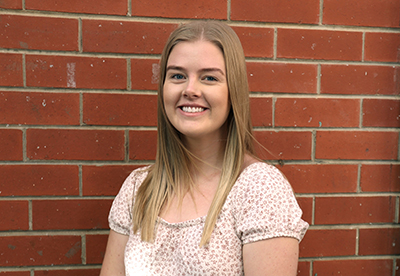 Dr Amelia Mardon has been awarded the Ian Davey Research Thesis Prize.
Dr Amelia Mardon has been awarded the Ian Davey Research Thesis Prize.UniSA postdoctoral researcher Dr Amelia Mardon has been awarded the Ian Davey Research Thesis Prize for her PhD research investigation, which led to advances in how pelvic pain is treated worldwide.
The Ian Davey Research Thesis Prize fund supports a prize to acknowledge the most outstanding research thesis by UniSA research degree student leading to a Doctor of Philosophy degree.
Dr Mardon has been awarded the prize for her thesis, conferred in 2024, translating evidence into practice: an investigation into the clinical management of pelvic pain. This research has had real world impact in leading advances on how pelvic pain is treated across the globe. Dr Mardon is currently a postdoctoral research fellow at NICM Health Research Institute, Western Sydney University and is coordinating a large clinical trial looking at medicinal cannabis for endometriosis. She is also furthering her research on pelvic pain education through co-designing online resources for young people, which is supported by an Early Career Researcher grant.
Dr Mardon’s PhD research has resulted in two systematic reviews of clinical practice guidelines, which provide the most comprehensive overview of how pelvic pain should be managed. These reviews are published in leading journals in the field of obstetrics and gynaecology (BJOG) and pain (PAIN), and their impact is evident with both articles being highly cited. Dr Mardon’s work has gained international media attention, with her research papers being featured in 18 news media outlets and being invited to give numerous media engagements (including written article interviews, radio interviews, and podcasts). Her research has also informed national guidelines (ANZCA and FPM Statement on the clinical approach to persistent pelvic pain including endometriosis associated pain; Queensland Health Clinical Guidelines Acute presentation of persistent pelvic pain) as supporting evidence to recommend pain education as a key component of pelvic pain management.
Dr Mardon is grateful towards the Davey family and the University selection committee for receiving this award.
“When you set out to do a PhD, you don’t do it for the accolades,” Dr Mardon says. “Nevertheless, to have recognition from the wider University community that your research is having an impact and for a condition such as pelvic pain that, historically, gets little attention, is very heartwarming indeed.”
UniSA physio student’s successful stretch at World Ultimate Frisbee Championships
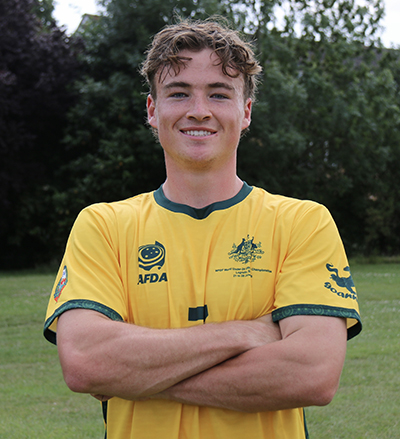
Reaching high in the #7 shirt is Daniel Roberts, a third year Physio student at UniSA who represented Australia at the World Ultimate Frisbee championships.
Daniel is one of the Goannas, the name of the Australian Men's U24 representatives' team at the WFDF WU24 World Ultimate Championships.
Proud mum and Professor of Regenerative Medicine at UniSA, Allison Cowin, says Daniel took up at the sport when he started at UniSA.
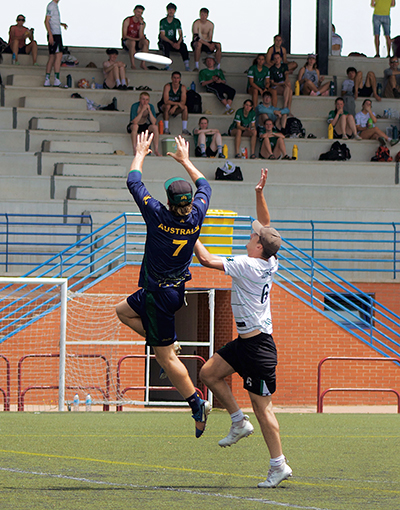
"He only started playing ultimate frisbee through joining the UniSA frisbee team through O Week and over the past three years has risen to be a state and now national team player," Allison says.
The Goannas played the championships games in Spain, where the team's social media manager, Eden Parker, has been supporting and photographing them in action.
"Daniel is an integral member of the team, a strong and reliable defensive player. He’s got incredibly quick reflexes, swift hands and can always be seen putting his body on the line, continuously laying out for the disc,” Parker says.
Other recent award winners
Other recent award winners from UniSA include:
- The UniSA Software Engineering Degree Apprenticeship was named Training and Mentorship Program of the Year at the 2025 Defence Connect Australian Defence Industry Awards in Canberra. There was a highly competitive field, with UniSA selected from a shortlist of 10 finalists. UniSA Dean of Programs (Information Technology & Mathematics) Professor Tom Raimondo says it was an “amazing outcome to be recognised amongst all the innovative work being done in this sector” and congratulated the team involved.
ANNOUNCEMENTS
UniSA led sustainability project secures new partner
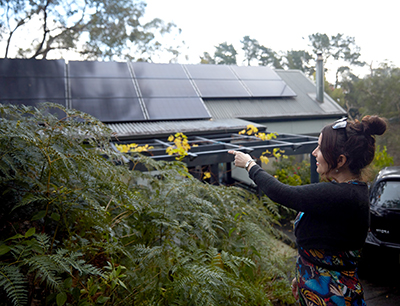 Dr Keri Hopeward discussing solar panels, a topic explored under the project’s ‘Energy’ theme. Image credit: Baxter Wiles, Green Adelaide.
Dr Keri Hopeward discussing solar panels, a topic explored under the project’s ‘Energy’ theme. Image credit: Baxter Wiles, Green Adelaide.A UniSA led project aimed at empowering individuals, households and communities to adopt more environmentally sustainable and regenerative lifestyles, has secured additional funding to continue its work.
Living Lightly Locally has secured additional funding from cooperative research centre for energy and carbon transformation, RACE for 2030, to continue its community-based sustainability work.
The Living Lightly Locally project centres around a free 12-month education and research program aimed at empowering individuals, households and communities to adopt more environmentally sustainable and regenerative lifestyles.
Each month, participants learn about a different topic, including waste, energy and transport, helping them explore their sustainability goals, identify barriers to change and work towards a shared vision of the future.
Participants share their journey through an online platform, from which UniSA researchers gather and analyse data to inform policymakers and help bring about the change required for people to ‘live lightly locally’.
This year marks the beginning of the project’s second three-year phase, and the team has secured $355,000 in funding from its partners, which include RACE for 2030 as well as Green Adelaide and the three participating councils – Mount Barker, Alexandrina and Mount Gambier.
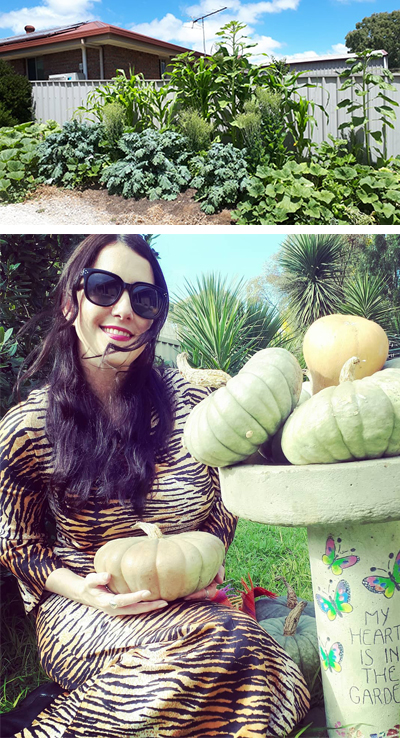 Growing fruits and vegetables is also part of the project’s curriculum, and is a focus during the ‘Garden’ month.
Growing fruits and vegetables is also part of the project’s curriculum, and is a focus during the ‘Garden’ month.Project lead and UniSA Senior Research Fellow Dr Keri Hopeward says the funding is critical to the project for more reasons than one.
“Without funding from our committed partners, the project would not exist,” Dr Hopeward says.
“In addition to employing researchers, having funds from a range of partner organisations ensures a diversity of voices throughout the project, and helps to ensure the findings remain relevant to the communities and end-users of the research.”
Established in 2020, RACE for 2030 is a cooperative research centre that funds a range of projects across the country to drive transformative and sustainable change in the environment and energy sector. This is the first time the organisation has been involved in the project.
Living Lightly Locally’s first three-year phase began in 2022 and involved 50 participants across two council regions. During this phase, the UniSA team developed key resources, including the pilot website and the development of 12 documentary style films featuring researchers, activists, experts and ‘local legends’ in the sustainability space.
Researchers also developed and refined their method of data collection – their ‘storytelling framework’ – during this phase.
“We generated over 50 different ‘stories of change’ from our participants in our first phase,” Dr Hopeward says.
“These stories documented each participant’s personal engagement with the program and its activities, and provided us with data for analysis.
“Some participants were so enthusiastic they enrolled in the second pilot too; one even nominated the program for an award in the SA Premier’s Climate Change Council’s Climate Leaders Awards.”
The second phase of the project will run from 2025 to 2027. This year, the team is busy analysing the data from the previous phase and fine-tuning its online delivery platform and data collection approaches. In 2026, the community participation stage will begin, followed by data collection and analysis in 2027.
Dr Hopeward and her UniSA team also want to use this second phase of the project as a blueprint for scalability.
“The vision for the project is for it to be scaled up and out, to reach local areas around SA and Australia, both to create and connect wider communities of changemakers while also facilitating the gathering and sharing of stories to enable change at scale,” she says.
“The current phase is intended to prototype such a scalable method.”
Other Stories
- The breakfast favourite that won’t crack your cholesterol
- Does artificial intelligence help uni students learn smarter or just faster?
- From the Vice Chancellor: 2025 is the year of firsts – and lasts
- Achievements and Announcements
- UniSA staff create safe spaces for conversation in SA communities
- The latest books from UniSA researchers




